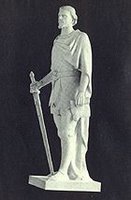
Roughly a year after Llywelyn ap Morgan succeeded to Tredegar, the small town of Newport (in 1385) was granted its first town charter. Llywelyn, himself, had been granted the Lordship of Magor which, although admittedly small, does give some indication of the local power that the owner of Tredegar wielded.
Within twenty years, the fledgling town of Newport would be all but destroyed, and Llywelyn would have his lands confiscated.
The force which swept all this away was the revolt of Owain Glyndwr. In 1400 Glyndwr, in open defiance of the King of England, Henry IV, was proclaimed Prince of Wales by his band of followers. In that first year, Denbigh, Rhuddlan, Flint, Oswestry, Ruthen and Hawarden all fell to the forces of Glyndwr. Nearly the whole of Northern and Central Wales was in his hands, and by the end of 1401 the revolt, like a forest fire, had spread into South Wales.
Llywelyn ap Morgan decided to pledge his support to Glyndwr. This may have stemmed from a feeling of shared blood between the two men, for not only were they obviously both Welsh, and no doubt shared a love of country, but they were also both descended from the old princes of Deheubarth. Was this to be a re-birth of those days; was Glyndwr to be a new, more national, version of Hywel Dda?
As far as both Glyndwr and Llywelyn ap Morgan were concerned sadly not, although how popular Glyndwr actually was in Newport after his near-total destruction of the town and sacking of its castle, is open to debate. It is also hard to gauge exactly how supportive the Morgans actually were to Glyndwr, and how much of it was down to self-preservation. For example, did Llywelyn's home at Tredegar survive the Glyndwr assault on Newport?
There was no question about the aftermath, however: when Glyndwr's revolt failed, Llywelyn ap Morgan had his estate sequestrated. He had lost Tredegar.
Llywelyn was also a Juror in the Inquisition of Hugh Stafford in 1387, which pretty much proves that he had come of age by that time.
Married: Jennet, daughter of David Vaughan
Children (thought to have been eight of them in total) included:
Ieaun
Christy m. Madoc ap Ieuan of Gelligaer
Ann m. John ap Jenkin
Click to view previous Tredegar owners in this series:
4. Morgan ap Llywelyn d.1384
3. Ifor Hael of Gwern y Cleppa
2. Llywelyn ap Ifor and Angharad
1. Sir Morgan ap Maredudd d. c1331
3 comments:
"how popular Glyndwr actually was in Newport after his near-total destruction of the town and sacking of its castle, is open to debate"
A recent BBC Wales TV programme about the Glyndwr uprising may add a new light on this Morgan's affiliation with the Welsh cause.
At the time the Norman/English hegemony had strengthened it's grip on Wales in the Marches by bunging up Castles, and settling them and the immediate area around them with English settlers. (A comparision with the Gaza Strip springs to mind.)
When Newport was sacked by Glyndwr, the Morgan's were obviously keen to help knock it down and displace their Norman/English usupers (they'd been around prior to 1066, remember).
If the Norman Herberts were Lord of the Manor of Newport at that period (as they were in the 1460s), that family rivalry also would have shoved the Morgan's in Glyndwr's direction.
When the uprising failed, and the English returned, the Morgan's paid the price for their rebellion. But it might be a misconception that "Welsh" Newport resented the "Welsh" uprising, as at that time Newport Castle and its environs were, more likely than not, "English".
The Lord of the Manor of Newport in 1402 was Edmund, 5th Earl of Stafford. He snuffed it in battle in 1403 to be replaced by his son Humphrey. The Earls of Stafford became Dukes of Buckingham, and it is their reversed chevron that we see on the Newport crest to this day.
But, all that is going off on a tangent, your point is a valid one. There is no reason to suggest that an ancient Welsh family like the Morgans (descended from the same princely stock as Glyndwr) would NOT support a Welsh rebellion.
Certainly, already we have seen with Llywelyn's great-grandfather Sir Morgan ap Maredudd, a long-running struggle for the family interest against the Normans ultimately spark into rebellion.
It just seems that Sir Morgan was slightly cleverer about it. Or perhaps the old excuse of: "I wasn't rebelling against you, Your Majesty, but against these damn local lords! Honest!" wasn't going to wash a second time.
I tend to agree with you, but nevertheless posed the question (with perhaps only the slightest hint of a mischievous twinkle in my eye)in the hope of sparking some debate.
Actually, just to be pedantic and amend my own post. The shield and chevron on the Newport coat of arms are indeed those of the Staffords, but Newport reversed the chevron to differentiate between the two.
Post a Comment